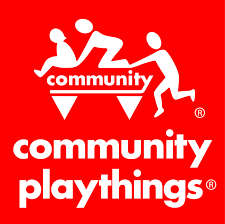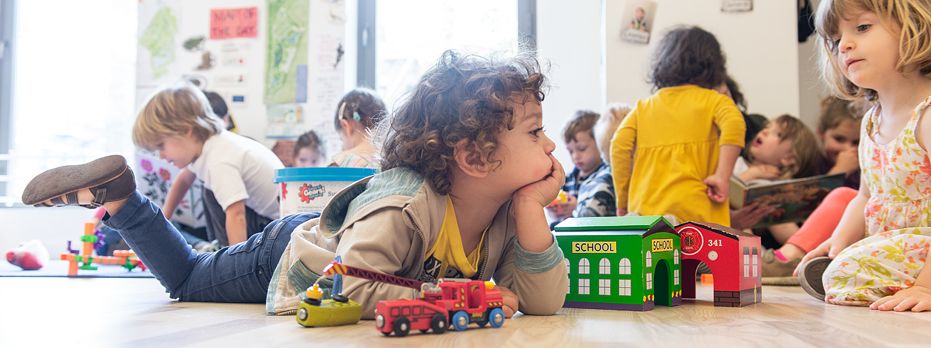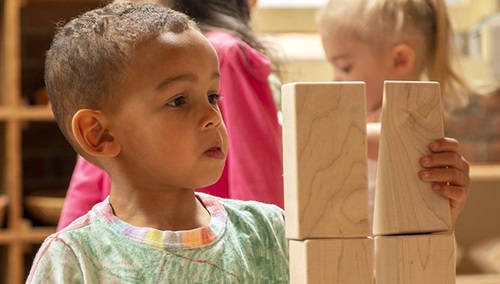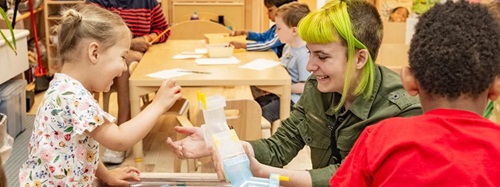What Has Happened to Play?
An Alarming Effect of Academic Mandates in Early Childhood Settings
| September 2016"My district mandates that all 4-year olds must be reading by the end of the Pre-K year—that means, before they enter kindergarten!! What research supports setting these ridiculous demands? How will they help my children in any way, now or in the future?”
“I feel very insecure about the benchmarks we are using to evaluate children. The expectations for reading achievement by the end of kindergarten have jumped up two levels in a couple of years.”
These comments are from two early childhood teachers concerned about how recent school reform mandates are affecting their work with young children. They represent just two of the many public school pre-K and kindergarten teachers I interviewed to learn more about how these mandates are changing early childhood practice (Levin & Van Hoorn, in press). They reveal just the tip of the iceberg of inappropriate practices teachers are required to implement in their classrooms.
Play: Endangered in the Classroom
I have been visiting pre-K and kindergarten classrooms to better understand the concerns voiced by many teachers dealing with the current school mandates. In most cases, I see children spending carefully regulated blocks of time doing highly structured, teacher-directed activities. Many of the activities focus on completing skill-based tasks in reading and math, with “only one right-answer.” It is common to hear that approximately two hours of reading, and at least one hour of math “instruction,” are required each day. Often teachers have formal, commercially produced curriculum materials to use for this instruction.
What about play in these classrooms? Very few hands-on play materials are present and when they are, there are few opportunities in the rigid daily schedule for children to play with them or children must use them in carefully prescribed ways. When activities that are called “play” do occur, they are often teacher assigned games involving basic skills with one right way to do them, like number and word lotto, or pattern block puzzles (Levin and McLaughlin 2016). Beyond these classroom “play activities,” some teachers say that they are allowed to have 20 minutes of recess after lunch; in some cases, just two or three days a week.
My interviews reveal that the more early childhood teachers seem to understand developmentally appropriate practice, the more concerned they are about what they are being asked to teach and how they are being told to teach it. They are also more concerned about what they are being told not to “teach”, i.e., play—with all the opportunities for facilitation of rich learning, and the development of readiness skills, that play can provide.
While the mandates vary somewhat from state to state, just about every state has them. These mandates are truly changing long established notions about appropriate practice in the early years. They are requiring more and more “direct” teaching of academic skills at younger and younger ages. There is frequent testing of how well children are mastering the mandated skills. Teachers are generally blamed if children do not do well on the tests (Dickey et al. 2016).
Why is play being driven out of classroom’s today when it has long been recognized by early childhood experts as central to young children’s development and learning (Elkind 2007)? There have often been discussions, even debates, about the following questions:
1. How much structure and guidance should adults provide in children’s play?
2. What kinds of toys should be used to promote the best play?
3. What other kinds of activities besides play are important for children’s optimal develop and learning?
However, the importance of play in helping young children establish essential foundations for later academic learning in later years has rarely been challenged.
The argument today seems to be that the sooner we begin teaching basic academic skills, the better children will do in school in the long run. There is little research to support such claims. In fact, there is much research to support the opposite, i.e. the educational value of play (Carlsson Paige et al. 2015). However, the mandates are being widely implemented nonetheless. Few, if any, early childhood educators who have been trained to meet the learning needs of young children, were consulted in the development of the new academic teaching standards.
Play: Endangered at Home
The loss of play in educational settings is even more worrisome than it otherwise might be if children had the same kinds of widespread opportunities for quality play at home that they did in the past. But, for quite some time now, there is growing concern about what is happening to play in homes. Children are spending more and more of the time they used to spend playing, entertained instead by a wide range of increasingly sophisticated screens (Levin 2013). The ubiquitous presence of TV programs, movies, videogames, IPads, IPhones, and much more, means that young children are exposed to screens morning, noon, and night, at home, in cars, in supermarkets. Screens now often take over what used to be times for child-centered, creative play, family playtime, and time for play with friends, both indoors and out.
In addition, when children do play, they often imitate scripts and characters that they have seen on screens (e.g., princesses and superheroes), rather than developing creative play based on their own experiences and needs, because this is the content they have to bring to their play. Many of today's toys are highly structured replicas of what children see on screens. These toys further channel children into narrow, media-linked, imitative play, rather than the kind of creative play facilitated by more open-ended materials that can be used in many ways.
Thus, many children have trouble using play at home to work out their own unique understanding and meanings, in their own unique ways—vital for both their intellectual growth and emotional wellbeing (Gray 2007, Levin 2016). And, because children are spending less time outside in their neighborhoods, playing on their own or with friends, their physical and social development is losing out at home as well (Levin 2012).
While play at home has been disappearing for quite some time, until recently we could rely on quality early childhood programs to help counteract the loss by providing play opportunities in their classrooms. In fact, in the play course that I teach at Wheelock College, I spend increasing amounts of course time helping students develop strategies for facilitating play to help ensure schools counteracted play deficits at home. But now, play is endangered at school too. Thus many teachers who deeply understand how to promote quality play are often tethered from doing so.
What Can We Do?
It is essential that all of us who appreciate the vital role of play in the lives of young children, do all we can to promote it—at home, in school, and in the wider society.
- We can work with families to help parents better understand the value of play, how to choose toys and play materials that promote quality play, and how to build quality play time into their family’s daily lives. We can also help parents better understand the impact of media and technology on play and develop strategies for dealing with it effectively—including setting clear rules, limits, and routines for using technology—in their children’s lives. I helped found the organization, Teachers Resisting Unhealthy Children’s Entertainment (TRUCE; www.truceteachers.org), which prepares materials to help parents understand the issues and develop these skills.
- We can train all early childhood educators to understand the importance of quality play; for social, emotional, and intellectual development; how to appropriately integrate early academic skills into a child-centered play process; and the vital role of play in helping establish the foundations for later more formal academic learning. All too often, play is crowded out of early childhood teacher training programs as there are more course requirements for certification in teaching the new academic skill mandates.
- We all need tobecome advocates at the school, community, and wider government policy levels—working against the current mandates that are driving play out of early childhood education and promoting appropriate practice, including educating all those involved about the vital role of play in the early learning process. Defending the Early Years (www.deyproject.org), an organization that I co-founded, seeks to rally educators to take action on policies that affect the education of young children and prepares materials to help them do so.
I want to close by thanking Community Playthings for its deep understanding and unfailing commitment to play, and its play materials that are at the heart of what promotes high quality play in the lives of children. We need you now more than ever!
References:
Carlsson-Paige, N., G. McLaughlin, and J. Almon. 2015. Reading Instruction in Kindergarten: Little to Gain & Much to Lose.Defending the Early Years (www.deyproject.org).
Dickey, K., K. Castle, and K. Pryor. 2016. “Reclaiming Play in Schools.” Childhood Education. (March/April).
Elkind, D. 2007. The Power of Play: Learning What Comes Naturally. Da Capo Press: Philadelphia, PA.
Gray, P. 2011. “The decline of play and the rise of psychopathology in children and adolescents.” American Journal of Play. 3(4): 443-463.
Levin, D. 2012. “Changing Times, Changing Play: Why Does It Matter?”Exchange Magazine. (August/September).
Levin, D. 2013. Beyond Remote-Controlled Childhood: Teaching Young Children in the Media Age. NAEYC: Washington, DC.
Levin, D., and G. McLaughlin. 2016. “Learning to Count to ‘14’ the Common Core Way and the Constructivist Way: What’s the Difference? Why Does It Matter?” Exchange Magazine. (March/April).
Levin, D. 2016. “Time Matters: The Importance of Sustained Play in Child Development.”Exchange Magazine. July/August.
Levin, D. and Van Hoorn, J. (in press). Teachers Speak Out: What Teachers of Low Income Children Have to Say about Ed Reform. Defending the Early Years (www.deyproject.org)






